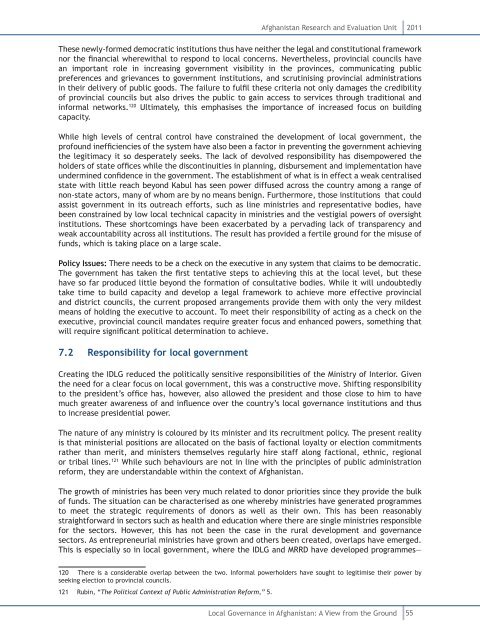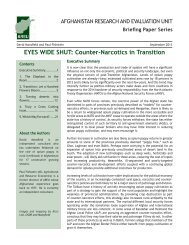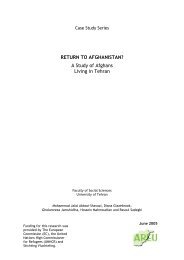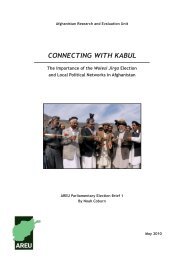Local Governance in Afghanistan: A View from the Ground
Local Governance in Afghanistan: A View from the Ground
Local Governance in Afghanistan: A View from the Ground
- No tags were found...
Create successful ePaper yourself
Turn your PDF publications into a flip-book with our unique Google optimized e-Paper software.
<strong>Afghanistan</strong> Research and Evaluation Unit<br />
2011<br />
These newly-formed democratic <strong>in</strong>stitutions thus have nei<strong>the</strong>r <strong>the</strong> legal and constitutional framework<br />
nor <strong>the</strong> f<strong>in</strong>ancial wherewithal to respond to local concerns. Never<strong>the</strong>less, prov<strong>in</strong>cial councils have<br />
an important role <strong>in</strong> <strong>in</strong>creas<strong>in</strong>g government visibility <strong>in</strong> <strong>the</strong> prov<strong>in</strong>ces, communicat<strong>in</strong>g public<br />
preferences and grievances to government <strong>in</strong>stitutions, and scrut<strong>in</strong>is<strong>in</strong>g prov<strong>in</strong>cial adm<strong>in</strong>istrations<br />
<strong>in</strong> <strong>the</strong>ir delivery of public goods. The failure to fulfil <strong>the</strong>se criteria not only damages <strong>the</strong> credibility<br />
of prov<strong>in</strong>cial councils but also drives <strong>the</strong> public to ga<strong>in</strong> access to services through traditional and<br />
<strong>in</strong>formal networks. 120 Ultimately, this emphasises <strong>the</strong> importance of <strong>in</strong>creased focus on build<strong>in</strong>g<br />
capacity.<br />
While high levels of central control have constra<strong>in</strong>ed <strong>the</strong> development of local government, <strong>the</strong><br />
profound <strong>in</strong>efficiencies of <strong>the</strong> system have also been a factor <strong>in</strong> prevent<strong>in</strong>g <strong>the</strong> government achiev<strong>in</strong>g<br />
<strong>the</strong> legitimacy it so desperately seeks. The lack of devolved responsibility has disempowered <strong>the</strong><br />
holders of state offices while <strong>the</strong> discont<strong>in</strong>uities <strong>in</strong> plann<strong>in</strong>g, disbursement and implementation have<br />
underm<strong>in</strong>ed confidence <strong>in</strong> <strong>the</strong> government. The establishment of what is <strong>in</strong> effect a weak centralised<br />
state with little reach beyond Kabul has seen power diffused across <strong>the</strong> country among a range of<br />
non-state actors, many of whom are by no means benign. Fur<strong>the</strong>rmore, those <strong>in</strong>stitutions that could<br />
assist government <strong>in</strong> its outreach efforts, such as l<strong>in</strong>e m<strong>in</strong>istries and representative bodies, have<br />
been constra<strong>in</strong>ed by low local technical capacity <strong>in</strong> m<strong>in</strong>istries and <strong>the</strong> vestigial powers of oversight<br />
<strong>in</strong>stitutions. These shortcom<strong>in</strong>gs have been exacerbated by a pervad<strong>in</strong>g lack of transparency and<br />
weak accountability across all <strong>in</strong>stitutions. The result has provided a fertile ground for <strong>the</strong> misuse of<br />
funds, which is tak<strong>in</strong>g place on a large scale.<br />
Policy Issues: There needs to be a check on <strong>the</strong> executive <strong>in</strong> any system that claims to be democratic.<br />
The government has taken <strong>the</strong> first tentative steps to achiev<strong>in</strong>g this at <strong>the</strong> local level, but <strong>the</strong>se<br />
have so far produced little beyond <strong>the</strong> formation of consultative bodies. While it will undoubtedly<br />
take time to build capacity and develop a legal framework to achieve more effective prov<strong>in</strong>cial<br />
and district councils, <strong>the</strong> current proposed arrangements provide <strong>the</strong>m with only <strong>the</strong> very mildest<br />
means of hold<strong>in</strong>g <strong>the</strong> executive to account. To meet <strong>the</strong>ir responsibility of act<strong>in</strong>g as a check on <strong>the</strong><br />
executive, prov<strong>in</strong>cial council mandates require greater focus and enhanced powers, someth<strong>in</strong>g that<br />
will require significant political determ<strong>in</strong>ation to achieve.<br />
7.2 Responsibility for local government<br />
Creat<strong>in</strong>g <strong>the</strong> IDLG reduced <strong>the</strong> politically sensitive responsibilities of <strong>the</strong> M<strong>in</strong>istry of Interior. Given<br />
<strong>the</strong> need for a clear focus on local government, this was a constructive move. Shift<strong>in</strong>g responsibility<br />
to <strong>the</strong> president’s office has, however, also allowed <strong>the</strong> president and those close to him to have<br />
much greater awareness of and <strong>in</strong>fluence over <strong>the</strong> country’s local governance <strong>in</strong>stitutions and thus<br />
to <strong>in</strong>crease presidential power.<br />
The nature of any m<strong>in</strong>istry is coloured by its m<strong>in</strong>ister and its recruitment policy. The present reality<br />
is that m<strong>in</strong>isterial positions are allocated on <strong>the</strong> basis of factional loyalty or election commitments<br />
ra<strong>the</strong>r than merit, and m<strong>in</strong>isters <strong>the</strong>mselves regularly hire staff along factional, ethnic, regional<br />
or tribal l<strong>in</strong>es. 121 While such behaviours are not <strong>in</strong> l<strong>in</strong>e with <strong>the</strong> pr<strong>in</strong>ciples of public adm<strong>in</strong>istration<br />
reform, <strong>the</strong>y are understandable with<strong>in</strong> <strong>the</strong> context of <strong>Afghanistan</strong>.<br />
The growth of m<strong>in</strong>istries has been very much related to donor priorities s<strong>in</strong>ce <strong>the</strong>y provide <strong>the</strong> bulk<br />
of funds. The situation can be characterised as one whereby m<strong>in</strong>istries have generated programmes<br />
to meet <strong>the</strong> strategic requirements of donors as well as <strong>the</strong>ir own. This has been reasonably<br />
straightforward <strong>in</strong> sectors such as health and education where <strong>the</strong>re are s<strong>in</strong>gle m<strong>in</strong>istries responsible<br />
for <strong>the</strong> sectors. However, this has not been <strong>the</strong> case <strong>in</strong> <strong>the</strong> rural development and governance<br />
sectors. As entrepreneurial m<strong>in</strong>istries have grown and o<strong>the</strong>rs been created, overlaps have emerged.<br />
This is especially so <strong>in</strong> local government, where <strong>the</strong> IDLG and MRRD have developed programmes—<br />
120 There is a considerable overlap between <strong>the</strong> two. Informal powerholders have sought to legitimise <strong>the</strong>ir power by<br />
seek<strong>in</strong>g election to prov<strong>in</strong>cial councils.<br />
121 Rub<strong>in</strong>, “The Political Context of Public Adm<strong>in</strong>istration Reform,” 5.<br />
<strong>Local</strong> <strong>Governance</strong> <strong>in</strong> <strong>Afghanistan</strong>: A <strong>View</strong> <strong>from</strong> <strong>the</strong> <strong>Ground</strong><br />
55

















